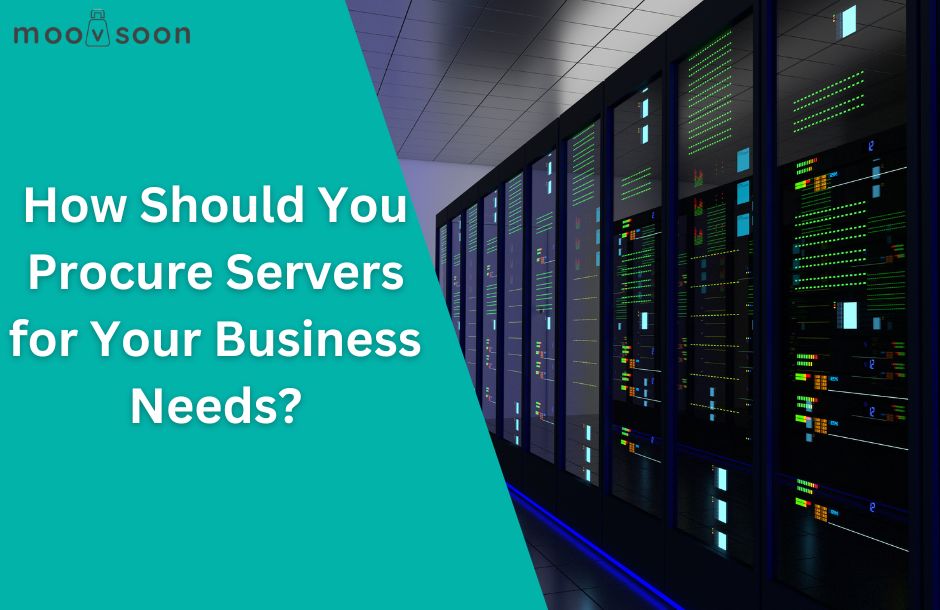
How Should You Procure Servers for Your Business Needs?
Server procurement for businesses requires strategic planning to match operational requirements and stay within budget constraints. Technology advancements have introduced diverse server options, including rack, blade, and tower servers, each designed to serve distinct operational scenarios. Rack servers maximize space utilization, while blade servers are most effective in environments like large data centers. When exploring ways to optimize your operations, consider how you can leverage moving leads which can complement your IT infrastructure planning.
Conducting a detailed analysis of operational requirements helps businesses identify required server capacity and avoid overspending. Sustainability trends have shifted focus towards evaluating total cost of ownership, encompassing both maintenance expenditures and energy consumption. Companies often achieve investment efficiencies by working with vendors that offer flexible payment terms and considering refurbished server options. Understanding core selection criteria helps business owners make choices that are consistent with their organizational objectives.

Key Decision Factors: Cloud Servers vs Physical Servers
Choosing between cloud servers and physical servers relies on multiple operational and financial considerations. Cloud servers operate on a pay-as-you-go model, which spreads operating costs over time and supports scalability based on evolving demands. Physical servers demand a substantial upfront investment but may deliver improved cost efficiency for organizations using stable, predictable workloads.
Organizations assess performance requirements when making a server choice. Cloud servers deliver flexibility and rapid scalability, which benefit businesses handling variable workloads throughout the year. Physical servers provide consistent high performance and enhanced data control for companies with stable operations and sensitivity to latency.
Security requirements play a major role during server selection. Cloud vendors implement advanced cybersecurity strategies, but many businesses select physical servers to maintain direct governance over in-house data protection policies.
Customizability and full technical control are prominent in physical server deployments. Cloud providers may limit direct infrastructure customization due to standardized service models and platform restrictions.
Comparing Costs: Cloud-Based Servers Versus Physical Servers
Cloud-based servers and physical servers present contrasting cost dynamics and deployment suitability. Cloud servers reduce initial expenditures by eliminating hardware investments, serving organizations with variable compute requirements and dynamic scaling needs.
Cloud pricing models align costs with resource usage, which can generate savings if resources are managed efficiently. Physical servers involve greater upfront costs for hardware and ongoing maintenance, yet they may offer better long-term value for businesses with steady, specialized workload needs.
Organizations base hardware infrastructure choices on budget, desired control, scaling requirements, and the predictability of their computational demands. Evaluating these variables enables first-time buyers or established businesses to select a solution matching their operational model. Our team at MoovSoon offers expertise and data-driven insights to help businesses navigate such complex operational decisions. For tailored support on integrating solutions that enhance business efficiency, feel free to explore our services or schedule a demo. You may also contact us at +1 (914) 255-5452.
Physical Server Deployment: Space and Security Insights
Physical server deployment introduces requirements for on-site infrastructure and robust physical security management. Businesses must allocate dedicated spaces—typically data centers—with efficient cooling and reliable power systems to house their server equipment. Security best practices include enforcing strict physical access controls, using surveillance systems, and implementing cybersecurity protocols to maintain data integrity and compliance.
Cloud servers address these same challenges by offering elastic compute capacity and shifting physical data protection responsibilities to off-site locations. An organization’s choice between deploying on-premise hardware or using cloud services depends on company size, the nature of its sensitive data, and desired flexibility in capacity expansion.
Physical servers facilitate superior control and steady performance, whereas cloud services maximize convenience and support predictable, usage-based cost management. We understand the unique needs of businesses at all scales and provide tools such as our realtor integration platforms to optimize workflow and lead conversion. If server scalability and data management are priorities for your company, please see it in action or call us anytime at +1 (914) 255-5452.
Comparing Accessibility: Cloud Servers vs. Physical Servers
Cloud servers enable users to access data and applications from any location with an internet connection. Organizations use this flexibility to support remote teams and operate effectively across different regions.
Cloud servers allow businesses to scale computing resources quickly by adjusting server specifications or capacity over the internet, eliminating the need for on-site hardware modifications.
Physical servers require users or IT staff to access and manage systems on location, limiting operational flexibility and increasing maintenance expenses. Companies decide between cloud and physical servers based on factors such as financial considerations, security protocols, and their operational requirements, with cloud servers offering greater accessibility and easier resource scalability in most situations.
How to Select the Best Physical Server for Your Business Size
The physical server type that aligns with your company’s size depends on the operational scale and the amount of resources you require. Small businesses typically use tower servers, which deliver cost-effective computing and support simple tasks such as file sharing and running basic business software.
Medium-sized organizations choose rack servers to gain increased processing capacity and adaptability, accommodating larger numbers of users and more complex applications.
Large companies opt for blade servers to access high-density compute power and support advanced processing demands and intensive applications. Blade servers let businesses use space efficiently and lower energy consumption in large-scale data centers.
Companies analyze their potential expansion and scaling requirements before picking a server model to ensure future business progression remains seamless.
Key Features of Tower Servers for Small Business Operations
Tower servers appeal to small businesses because they combine affordable pricing with operational versatility. Organizations can scale by easily upgrading internal components such as memory and storage as business volume increases.
Tower servers conserve space by fitting into smaller office setups, presenting a straightforward solution for limited environments. These servers support a range of business applications through dependable processors and multiple connection ports, enabling broad utility.
The individual chassis design offers simplified maintenance and tends to minimize system interruptions during hardware servicing. As a result, tower servers present small businesses with a balanced solution between technical capability and cost management.
Why Rack Servers Suit Expanding Business Infrastructures
Rack servers deliver scalability for growing businesses by supporting seamless integration of additional servers as workload demands increase. Companies utilize rack servers to add computing resources without needing much extra floor space, which helps expand IT capabilities efficiently.
Rack servers maintain optimal operating temperatures and manage energy effectively to ensure continuous high performance as demands increase. Rack servers also facilitate virtualization, allowing organizations to operate multiple applications on fewer physical devices, helping reduce operational expenses and making IT administration simpler.
Companies that project rapid expansion select rack servers for their flexible configuration options and stable infrastructure advantages. At MoovSoon, we provide realtor data integration tools and services that align with growth strategies and operational scalability. For more information about how our services can support your IT infrastructure needs, please book demo or reach out by phone at +1 (914) 255-5452.
Reasons Large Enterprises Select Blade Servers
Large enterprises select blade servers for their high efficiency and scalability in dense data center environments. Blade server solutions minimize physical footprints while conserving energy usage in enterprise-level IT deployments.
Blade servers streamline scalability through simplified addition of computing modules, allowing enterprises to enhance processing power without major alterations to existing infrastructure. Blade servers also strengthen operational management, which helps organizations achieve high performance and quick adaptation to business changes.
Key Benefits of Virtualization in Server Procurement
Virtualization introduces tangible benefits during server procurement by maximizing asset use and consolidating workloads on fewer machines. Businesses achieve greater server utilization through running multiple virtual environments on a single device, which reduces both acquisition and ongoing hardware maintenance expenses.
Virtualization also creates operational agility, allowing companies to rapidly set up new server instances or adjust system capacities without constructing extra physical infrastructure.
Organizations improve business continuity since virtualization enables quick backup and restoration of virtual environments if server issues occur.
Virtualization enhances cybersecurity by confining workloads within separate digital spaces, limiting the possibility of system-wide threats.
Energy use is also improved because virtualized environments minimize physical server counts, helping decrease both power draw and data center cooling needs.
Virtualization Benefits: How One Server Can Replace Many
Virtualization reduces the need for multiple servers because one physical server can host several virtual machines. Each virtual machine runs its own operating system and applications, functioning as an independent server. This setup lowers hardware expenses and makes server management easier by shrinking the physical infrastructure required.
Virtualization improves resource utilization by enabling dynamic allocation of resources to virtual machines according to demand, which increases operational efficiency and scalability. It provides flexibility by supporting straightforward backups, rapid migrations, and streamlined disaster recovery, resulting in a more efficient and cost-effective server procurement process.
Top Cost Reduction Strategies with Virtualization
Virtualization creates significant savings in server procurement because it increases resource utilization and lowers hardware expenditures. When multiple virtual servers operate on a single physical machine, organizations buy less hardware, reducing initial and ongoing costs.
This method cuts power usage and lessens cooling needs, which directly lowers operational expenses. Virtualization supports adaptable scaling and resource adjustment, so businesses can respond to changing requirements without purchasing additional physical servers.
For these reasons, virtualization stands out as an economical solution for today’s business server needs.
Pre-Made vs. Custom-Built Servers: Which Is Right for Your Business?
Selecting between pre-made and custom-built servers for your business depends on your operational requirements and available resources. Pre-made servers deliver ease of setup and reliability, often including warranties and support from manufacturers such as Dell or HP. These servers suit organizations that require quick implementation and uniform solutions.
Custom-built servers offer adaptability and expandability, enabling organizations to configure hardware and software to match particular workloads. Customization can result in targeted cost reductions and improved performance for specialized tasks.
Small and medium businesses often prefer pre-made servers because of their affordable initial investment and straightforward maintenance. Larger businesses facing complex challenges may choose custom-built solutions for greater flexibility. Assessing your company’s technical needs, budget, and plans for expansion helps determine the right server option for consistent operational alignment.
Key Advantages of Assembling Servers In-House for Businesses
Organizations that assemble servers in-house gain multiple advantages for their operations. Businesses can create tailored server configurations to support specific operational requirements, which helps achieve high performance.
Companies lower their expenses by selecting cost-effective components for server assembly. These practices also give teams flexibility to upgrade or scale systems efficiently as company demands change.
In-house server assembly also lets IT teams maintain stricter control over security protocols, which limits exposure to threats from external sources. Custom-built servers help teams improve operational efficiency, support scaling needs, and reinforce cybersecurity in business IT environments.
Security and Reliability Features of Pre-Made Servers
Pre-made servers deliver strong security and reliable performance to address business requirements. These servers include integrated protection tools, such as advanced firewalls and encryption, which receive frequent manufacturer updates to reinforce safety.
Manufacturers subject pre-made servers to comprehensive testing, confirming consistent operation and high stability under many conditions to support reliable business infrastructure.
Vendor support teams address security risks and technical issues for pre-made servers quickly, which helps maintain dependable server performance. Pre-made solutions give organizations a dependable mix of secure, reliable performance and rapid setup.
Conclusion: Effective Server Selection Strategies for Businesses
Organizations must align server acquisition strategies with both current requirements and long-term objectives. Companies should examine the entire server lifecycle—covering deployment through decommissioning—to control expenses and drive performance improvements across time.
Evaluation between pre-built and custom server solutions supports better decision-making. Pre-built devices provide fast implementation and dependable performance standards, while custom builds can offer specifically tailored features. Always assess the total ownership cost by including energy use along with initial investment.
Maintaining close relationships with suppliers and clear support agreements is essential for continuous operations. Reliable vendor partnerships deliver timely help and favorable support conditions in response to unexpected problems. By consistently reviewing procurement methods, teams can keep pace with technological advances and evolving business demands. Our team at MoovSoon is here to assist you with seamless integration of marketing and lead generation tools tailored to your business. Feel free to contact us at info@moovsoon.com.



